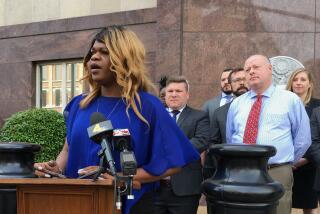Idaho same-sex marriage ban struck down by federal judge
Idaho’s same-sex marriage ban became the latest to be declared unconstitutional Tuesday when a federal judge handed another victory to gay and lesbian couples. That extended a unanimous streak of rulings across the country over the last year.
“Marriage is a fundamental right of all citizens, which neither tradition nor the majority may deny,” Chief Magistrate Judge Candy Wagahoff Dale wrote in her opinion.
Dale did not suspend her ruling, as several other federal judges have done after striking down such bans elsewhere. But the governor’s attorney had filed a request for a stay Monday, just in case, and plans to appeal Dale’s ruling.
In addition, Todd Dvorak, a spokesman for the state attorney general, said, “The attorney general’s office intends to file a motion for a stay on Wednesday and an appeal is forthcoming.”
Dale’s order is scheduled to take effect at 9 a.m. Friday, giving the state a window of opportunity to secure a stay before gay and lesbian couples get a chance to marry.
Gov. C.L. “Butch” Otter called the court’s decision “disappointing” and vowed to fight the ruling, which nullified a 2006 referendum that won 63% of the vote and enshrined the ban in the state constitution.
“In 2006, the people of Idaho exercised their fundamental right, reaffirming that marriage is the union of a man and a woman,” Otter said in a statement. “Today’s decision, while disappointing, is a small setback in a long-term battle that will end at the U.S. Supreme Court. I am firmly committed to upholding the will of the people and defending our constitution.”
In her ruling, Dale echoed other rulings in federal cases around the country and called the state’s arguments for the ban unfounded.
“The defendants offered no evidence that same-sex marriage would adversely affect opposite-sex marriages or the well-being of children,” Dale wrote of state officials named in a lawsuit seeking to overturn the ban. “Without proof, the defendants’ justifications echo the unsubstantiated fears that could not prop up the anti-miscegenation laws and rigid gender roles of days past.”
In the case, filed in November, four couples – all women – sued the state, the Ada County recorder and Otter in an effort to overturn the ban.
Sue Latta and Traci Ehlers were among the plaintiffs. They live in Boise, have been together for a decade and were married in California in 2008.
Latta said she was deeply moved by the decision.
“After living in Idaho for more than two decades, it means so much for a court to recognize our family and say that we must be treated equally,” Latta said in a statement. “We love this state and want nothing more than to be treated as equal citizens who contribute to the community and help make Idaho an even better place for everyone who lives here.
“Today’s ruling means that we can finally have the same legal protections as other married couples and the security of knowing that our family is legally secure.”
Just eight days ago, in a crowded courtroom in Boise, Dale had heard oral arguments in the lawsuit, Latta vs. Otter, and promised to return with her judgment swiftly.
Idaho voters had approved one of the most restrictive measures in the country, outlawing not just same-sex marriage, but also civil unions and domestic partnerships in this deeply conservative state, home to the second-highest concentration of Mormons behind Utah.
“A marriage between a man and a woman is the only domestic legal union that shall be valid or recognized in the state,” Amendment 2 to the Idaho Constitution reads.
In addition to grilling attorneys on both sides about what effect the fast-moving legal landscape and recent court decisions around the rights of gays and lesbians have on the current case, Dale had also questioned what “the design, purpose and effect” of the Idaho ban has been.
Attorneys for the defendants pointed to two fundamental issues – tradition and the protection of children – as they argued for upholding the ban and Idaho’s refusal to recognize same-sex marriages legally performed in other places.
“The citizens of Idaho made a choice to enshrine the roles of mother and father into the lives of children,” Thomas Perry, the governor’s attorney, had said. “We believe that there are significant risks imposed in redefining marriage in genderless terms.”
The governor had also said keeping the ban would uphold religious liberty, which has become an increasingly popular line of argument among conservatives as same-sex marriage has gained legal traction around the country.
“Not all religions share the view that opposite-sex marriage is a theological imperative,” Dale wrote in Tuesday’s ruling, adding that some of the case’s same-sex plaintiffs belonged to religious congregations that define marriage otherwise. “To the extent Governor Otter argues that Idaho has a legitimate interest in validating a particular religious view of marriage, that argument blithely disregards the religious liberty of congregations active in Idaho.”
Evan Wolfson, president of the advocacy group Freedom to Marry, noted that Dale’s decision was the “latest in more than a dozen rulings unanimously holding marriage discrimination unconstitutional.”
In states as disparate as Idaho, Arkansas, Utah and Michigan, he said in a statement, “the courts are affirming that there is no good reason for government to deny marriage to committed couples. As gay couples and their families begin to share in the joy and security of the freedom to marry, hearts and minds are opening, discrimination’s barriers are falling, and we’re moving our country to the right side of history.”
He said the nation is ready for such a civil rights sea change, noting that “a record-high 59% of Americans support marriage for same-sex couples, with majority support now in every region of the country.”
Tuesday’s ruling will be appealed to the U.S. 9th Circuit Court of Appeals in San Francisco.
More to Read
Sign up for Essential California
The most important California stories and recommendations in your inbox every morning.
You may occasionally receive promotional content from the Los Angeles Times.











